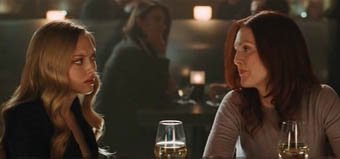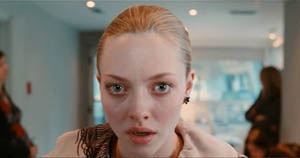|
Atom Egoyan makes movies about emotions and secrets more than about conventional plots. This film does have one of those, though many of his previous works often seem to be lacking one (eg. the ambitious but muddled Ararat). What they never lack is a microscope's eye-view on the tumultuous roilings that can be found inside anyone's head. 
Catherine is convinced her husband David is having an affair after many long years of marriage. Perhaps he is. It certainly looks that way to us; he's nothing if not an irrepressible flirt. Determined to find out one way or the other, Catherine hires a young, high-class call girl to set up a temptation scenario for David. The call girl, known only as Chloe, she initially meets in the ladies' room following what appears to be an unpleasant professional encounter for the young woman. Something passes between them then, though we aren't sure what. What will eventually pass between them are stories, stories of Chloe's encounters with David. At first, Catherine cannot bear to hear what she's being told. After a point, she finds she cannot stop listening. After years of gradual cooling in her marriage, Chloe's descriptions are the most involving experiences she's had for a good long while. Chloe herself (Amanda Seyfried), despite intially appearing to serve a purely utilitarian function within the story, is probably the most interesting character to be met herein. She's neither a tramp nor a hooker with a heart of gold, but rather a self-described expert at reading people and providing what they want, which is often not what she wants-she is, after all, providing a service, though it isn't much of a stretch to presume she would also know quite well how to accomplish her own needs. She's reserved, detached, but never cold. Her views on the alienating nature of the Internet (alienating because, ironically, it's utterly open) mirror my own; I imagine we could get on famously if I could ignore what she did for a living. Seyfried's eyes and lips are larger than the average girl's; even her most subtle expressions read enormously. In one pivotal scene, Chloe is ushered away after an upsetting conversation during which she feels betrayed and cheapened, and walks straight into a tight close-up which holds far longer than most directors would have dared. We're conditioned to expect this to be building to a reversal in which she storms back into a confrontation. Egoyan's camera instead allows us to watch the stampede of emotions warring on her face; her extended pause in place is not preparatory to anything in particular, it's an expression of mental paralysis as she processes what she's suddenly feeling, something many of us have probably done in our lives. 
If I had to describe this film with a single attribute, it would be "voyerism." The most immediately obvious example is the one closest to the surface: the film is about sexual politics, and Egoyan doesn't shy away from the material by hiding it in a closet or behind any other closed door. Many will doubtlessly come to this film in anticipation of seeing up-and-comer Seyfried undressed, and won't leave disappointed. Catherine's revelatory thrill at hearing her husband's escapades detailed by his apparent mistress is a more abstracted form of voyerism. Even Catherine's aloof relationship with her son is a bizarre example. While she expresses disdain upon finding that he and his girlfriend have been sleeping together under her roof, her subsequent spying and eavesdropping suggest an undercurrent of envy for their youthful vitality. On the other hand, while he is understandably embarrassed by his mother's discovery, his utter carelessness at hiding what he's up to feels unreal. No teenaged boy on earth is going to have a talk with his mom about his sex life whilst wearing nothing but his underwear. As is the case with many artsy, exacting directors who make it a habit to plumb less-examined facets of human behavior, there is the tendency to dismiss seeming errors as the fault of the viewer's perception, but I find this approach, sometimes right that it may be, to be too convenient a dodge. Sometimes what seems to be a mistake really is a mistake. If Chloe has just one mistake, it's in having an ending that feels as though it was grafted on from a lesser movie. While the plot is nothing if not contrived, there are differing levels of contrivance present in films that the story would do well to acknowledge; one wouldn't, despite their inherently unrealistic nature, expect a James Bond film to contain ghosts or UFOs, just for one example. The divergence here isn't so severe as that, but it does feel too pat and convenient the way the story jumps grooves from drama to melodrama in the final act, as if the writer could find no other way that the plot could actually come to a conclusion. If Chloe the character is brilliantly skilled at satisfying her customers, Chloe the movie is isn't quite her equal. In some cases, the journey really is more rewarding than the destination, and there are at least many sights on this journey worth seeing.
-review by Matt Murray
|
|
||||||||